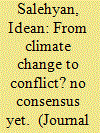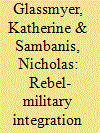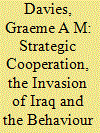|
|
|
Sort Order |
|
|
|
Items / Page
|
|
|
|
|
|
|
| Srl | Item |
| 1 |
ID:
082410


|
|
|
|
|
| Publication |
2008.
|
| Summary/Abstract |
There is a broad consensus that democracy and economic development are among the key factors that promote better human rights practices in nations, but there is little agreement on how this happens. This article reports evidence that human rights, democracy, and development may all be at least partially explained by a fourth factor: market-contracting. Studies in economic history and sociology have established that in developing countries many exchanges of goods and services occur within social networks of friends and family. New institutionalist approaches posit that daily habits give rise to corresponding values and world-views. This study integrates these two fields of study to show how economic dependency on friends and family can promote perceived interests in discriminating strangers from out-groups and abiding by the orders of leaders. Dependency on strangers on a market, in contrast, can promote more individualistic identities and perceived interests in a state that enforces law and contracts with impartiality. This may cause the governments of nations with marketplace societies to be less likely than others to imprison political opponents and act contrary to law. On a large sample of nations from 1977 to 2000, robust support is found for this view: a change from weak to high levels of market-contracting is associated with a substantial 49% to 61% reduction in risk of state repression in nations. At least some of the variance in state repression accounted for by democracy and development may be attributed to market-contracting. This article introduces a new and robust variable in the field of human rights research, with direct policy implications: to reduce state repression, a crucial task is the achievement of market-oriented economic development
|
|
|
|
|
|
|
|
|
|
|
|
|
|
|
|
| 2 |
ID:
082414


|
|
|
|
|
| Publication |
2008.
|
| Summary/Abstract |
This exploratory study attempts to explain how journalistic routines for covering violent conflict lead to the construction of ethnocentric news. A distinction is made between two sets of routines. One set is permanent and ensures ethnocentric control over the flow of information, while a second set varies as journalists construct coherent narratives for particular events. This latter set of routines is further broken down into what are labeled the `Victims Mode' and `Defensive Mode' of reporting. The Victims Mode is used when one's own citizens have suffered an especially tragic loss of life, while the Defensive Mode is employed when one's forces have carried out an attack that has inflicted a similar loss on the enemy. It is argued that each of these modes of reporting parallels psychological reactions that have been found in individuals. The ideas raised in the theoretical discussion are investigated by comparing coverage of two events by Israeli and Palestinian television. Two events were chosen for analysis: a Palestinian suicide bombing that killed 19 Israelis, and the killing of Hamas leader Sheik Salach Shehadeh in which 16 Palestinians were killed. An in-depth reading of the six news broadcasts provides important insights into how journalists' routines ensure a steady flow of culturally acceptable news stories that reinforce hatred between enemies.
|
|
|
|
|
|
|
|
|
|
|
|
|
|
|
|
| 3 |
ID:
082409


|
|
|
|
|
| Publication |
2008.
|
| Summary/Abstract |
Many scholars, policymakers, and activists have argued that climate change will lead to resource competition, mass migration, and, ultimately, an increase in armed conflict around the world. This article takes issue with the `deterministic' view that climate change and resultant resource scarcities will have a direct impact on political violence. Rather, the effect of climate change on armed conflict is contingent on a number of political and social variables, which, if ignored by analysts, can lead to poor predictions about when and where conflict is likely. This article then discusses ways to improve research on the climate change-conflict connection and outlines broad policy suggestions for dealing with this potential problem. Scholars must communicate their findings with the policy community in order to come up with prudent solutions to this problem, while countering unnecessary rhetoric on both sides of the debate.
|
|
|
|
|
|
|
|
|
|
|
|
|
|
|
|
| 4 |
ID:
082412


|
|
|
|
|
| Publication |
2008.
|
| Summary/Abstract |
Civil wars are far less likely to end in peace agreements than are international wars, and more than a third of civil wars restart within a few years. This may be due to the time-inconsistency of peace settlements in civil wars: once the rebels demobilize, they lose bargaining power and the government can renege on its promises. This makes rebels reluctant to stop fighting and quick to remobilize for a fight. A self-enforcing agreement could prevent this, but it is difficult to create such agreements. Recent efforts to structure self-enforcing agreements after civil wars have involved the integration of former rebels in a new national army. This solution should make unilateral defection from peace settlements more costly. This is an increasingly popular mechanism used in peace settlements, but it is not yet well understood. We do not know if it works or under what conditions it is likely to be used. This article provides the first systematic study of rebel-military integration agreements and considers if and how such agreements can help build peace. It also analyzes the conditions under which such agreements will be reached and implemented. The analysis suggests that rebel-military integration has not been an effective peacebuilding mechanism, but this is often due to poor implementation of the agreements
|
|
|
|
|
|
|
|
|
|
|
|
|
|
|
|
| 5 |
ID:
082415


|
|
|
|
|
| Publication |
2008.
|
| Summary/Abstract |
Since 11 September 2001, the religious dimension of conflict has been the focus of increasing attention. In The Clash of Civilizations, Huntington has identified the West in religious-cultural terms, as Christian with a dominant democratic culture emphasizing tolerance, moderation and consensus. The persistence of conflict in Northern Ireland among `White' Protestant and Catholic Christians undermines this simplistic argument and demands a more subtle understanding of the role of religion and fundamentalism in contemporary conflict. Modernization theory - which is echoed among some theorists of globalization - had predicted the declining importance of religion as the world became industrialized and increasingly interconnected. This is echoed by those who argue that the Northern Ireland conflict is `ethno-national' and dismiss the role of religion. On the other hand, others have claimed that the conflict is religious and stress the role of Protestant fundamentalism. This article draws on new evidence from Northern Ireland of the complex and subtle ways in which religion impacts on the conflict there, incorporating insights about the pragmatism of fundamentalist Protestants and how religious actors are contributing to conflict transformation. This analysis leads to three broader conclusions about understanding conflicts with religious dimensions. First, the complexity of religion must be understood, and this includes a willingness to recognize the adaptability of fundamentalisms to particular contexts. Second, engaging with fundamentalists and taking their grievances seriously opens up possibilities for conflict transformation. Third, governments and religious actors within civil society can play complementary roles in constructing alternative (religious) ideologies and structures as part of a process of transformation. In a world in which the impact of religion is persistent, engaging with the religious dimension is a vital part of a broader-based strategy for dealing with conflict
|
|
|
|
|
|
|
|
|
|
|
|
|
|
|
|
| 6 |
ID:
082413


|
|
|
|
|
| Publication |
2008.
|
| Summary/Abstract |
The study, using an autoregressive model and a time series of events data, tests whether Iran, Syria and North Korea have altered their behaviour towards the USA in response to the US occupation of Iraq. In particular, the study posits a modified theory of `strategic conflict avoidance', suggesting that perceived failings in US policy towards Iraq that manifest in low popularity ratings have, in fact, constrained the US president from initiating future aggressive actions. Potential targets of US aggression, rather than becoming more cooperative towards an unpopular US president, as suggested by strategic conflict avoidance theory, now become more hostile as they take advantage of public unease with an adventurous foreign policy. The analysis provides mixed support for the hypothesis, finding that North Korea has altered its strategic conflict avoidance behaviour in response to the Iraq occupation. Syria has become more hostile towards the USA, whereas, surprisingly, Iran is relatively uninfluenced by US domestic politics. The article suggests that coercive strategies might provide an opening in current US negotiations with North Korea, but also worryingly concludes, on the basis of the evidence, that the chances of a negotiated settlement with Iran are small
|
|
|
|
|
|
|
|
|
|
|
|
|
|
|
|
| 7 |
ID:
082411


|
|
|
|
|
| Publication |
2008.
|
| Summary/Abstract |
What effect do third parties have on the evolution of civil wars? The authors argue that intervention by third parties is central to the civil war process, a process that is characterized by the duration of hostilities and the type of outcome. The authors examine empirically the effect of third-party intervention into civil wars during the period 1816-1997, using the event history framework of competing risks. From the perspective of competing risks, as a civil war endures, it is at risk of experiencing a transition to one of three civil war outcomes in our sample: military victory by the government, military victory by the opposition group, and negotiated settlement. The competing risks approach provides considerably better leverage on the dynamic qualities of civil wars and, in particular, the influence of interventions by third parties. The analysis suggests that third-party interventions can be decisive in the evolution of civil wars and that third-party interventions have a different effect on the duration than different civil war outcomes. The results show that third-party intervention decreases the time until the supported group achieves military victory. Furthermore, third-party interventions, on both the government and opposition sides, increase the time until a negotiated settlement
|
|
|
|
|
|
|
|
|
|
|
|
|
|
|
|
|
|
|
|
|